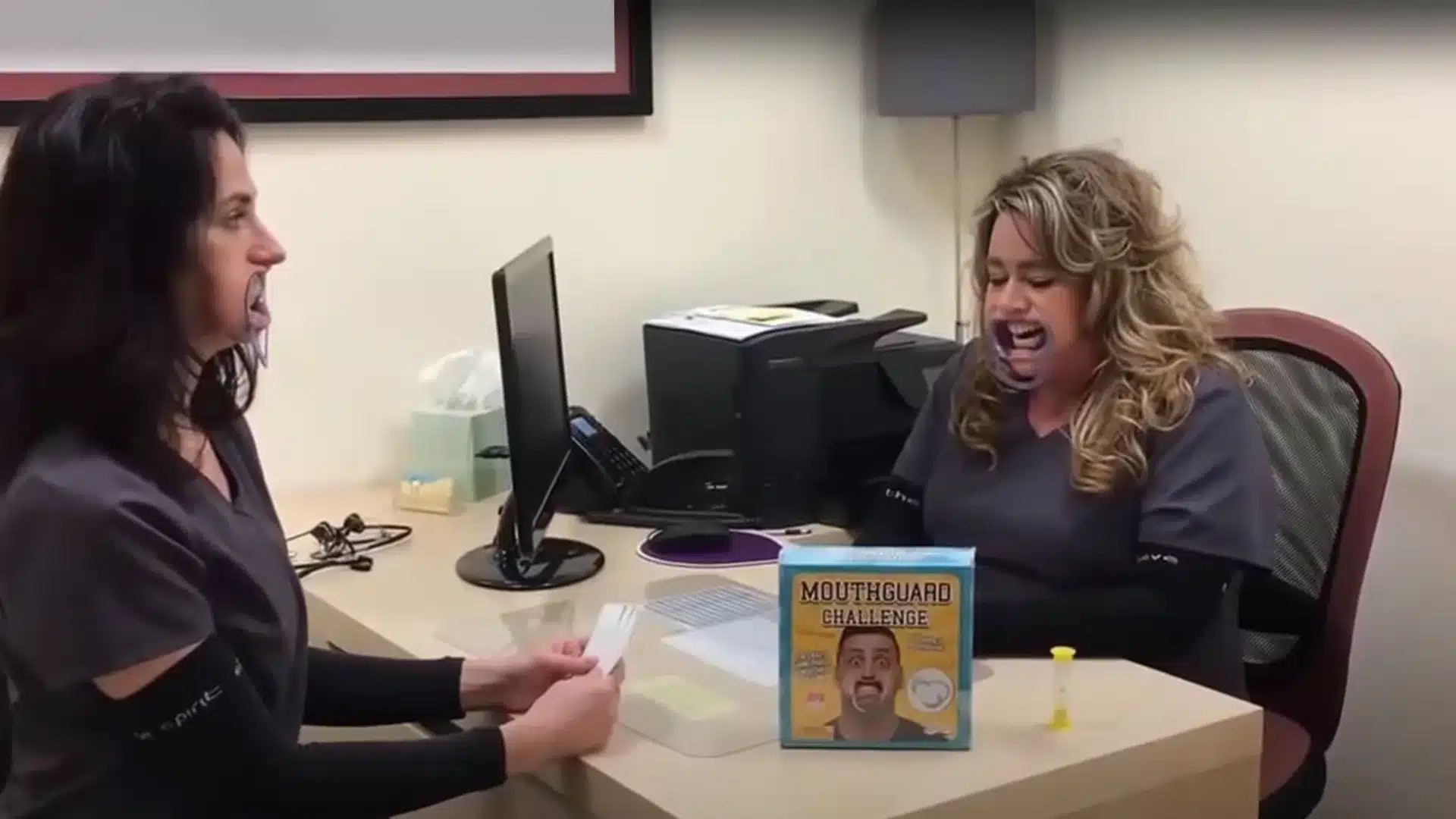Dog Eating Dentures & Other Mishaps to Avoid!
As a dentist it’s amazing how many times I’ve heard patients tell me they just want to get all of their teeth pulled and get dentures because it seems a lot easier overall for patients who struggle with oral health. In theory they do seem easier sometimes, but as someone who helps folks with dentures for a living, I’m here to tell you that while they’re sometimes a great solution, they’re not as ideal as you might think.
While dentures do require less effort than taking care of the teeth you were born with, it’s not a set it and forget it situation. There are still some basic denture maintenance things that need to happen, at various intervals, in order to keep them both clean and functional.
Here are a few typical questions I get, as well as several common mistakes to avoid.
Should I take them out at night?
Yes, you should be taking your dentures out at night.
Most people take off their jewelry and/or watch when they go to bed, but it’s amazing how many people sleep with their dentures in. I once had a lady say to me, “What if I had an emergency in the middle of the night and had to go to the hospital in an ambulance, I would want my teeth!” Well, while I suppose that could happen, I really do advise leaving them out for a couple of reasons.
- it gives your gums a chance to “breathe” (be exposed to air), thereby avoiding a nasty case of candidiasis (which is waaaay more likely than an unplanned 2am ride to your local emergency room)
- you get to disinfect them in a cleaning solution for several hours- yay, clean breath!
- if you happen to be a clencher or grinder, it reduces wear, tear and the likelihood of fractures developing in the denture
So unless you’re a sleepwalker who hits up the fridge for a midnight snack, there’s really no functional reason to have them in. Leave them on your nightstand, I promise the tooth fairy won’t whisk them away while you are sleeping.
The dog ate my dentures! Now what?
Call your vet a call, then call us.
Depending on how much of your denture is mia, you want to give your vet a call and get your pup checked out to ensure there’s no lasting damage. Then you’ll want to call me and set up an appointment to replace your dentures as quickly as possible.
Believe it or not, this happens. Quite often.

It’s important to protect your dentures when they’re not in your mouth, especially when you’re sleeping. I don’t recommend leaving your dentures under your pillow while you sleep, because while it seems like they’re made of a non-absorbent material, they are actually very porous. They’re designed to go in a wet environment.
You wouldn’t remove your contact lenses and just leave them on the nightstand, or put them in the little case without any solution, right? Allowing your dentures to dry out can also cause them to warp, and they are not like a memory foam mattress – they don’t readjust to your mouth once you put them back in.
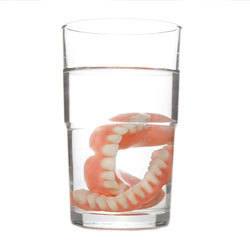
One of the best things to do is fully submerge them in water. The classic picture of your grandmother’s teeth in a glass on the nightstand is the right idea . . .
However, this can increase the risk of you or your dog (cat, kid, spouse) knocking it over, meaning you’ll be dealing with spills, shattered glass and possibly even a broken denture. And, if you have a metal denture and the framework gets bent, it can be super hard to adjust it back into the original position. Just saying.
Most people actually like to be a little discreet when it comes to leaving their false teeth laying around, which is why a denture box makes for safe, cheap, and inconspicuous storage that will protect both your pride and your investment. If you’ve lost yours, just ask, and I’ll give you a new one.
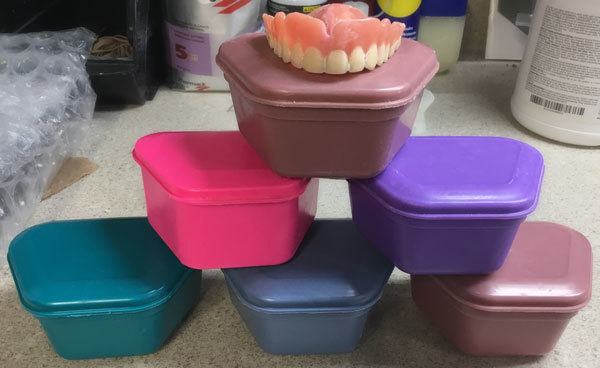
How Often Should I Brush My False Teeth?
You should clean your dentures after you eat, or at least twice a day.
So this might sound rather obvious, but you really shouldn’t clean your denture while you’re wearing it. You miss one of the most important places – the underneath – and any food or bacteria will sit there and grow, which can then causes oral candidiasis. Plus, if you have existing teeth that the denture hooks to, they are not being given a proper brush either, which can quickly lead to gum disease and dental decay.
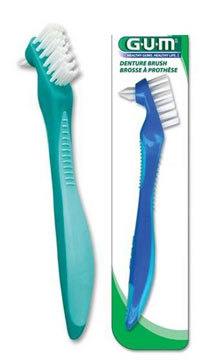
In an ideal world, I’d like to see patients clean their denture after each time they eat, even if it’s just a quick rinse off. However, I get that this is not always possible, so at least aim for twice a day.
Again, this means a rinse under the tap (you should not use hot water as this can warp the denture and/or damage the color) and you’ll still need a soft bristled toothbrush and non-abrasive toothpaste (aka not one of those whitening kinds) so you don’t scratch it, but still get off any gunk that has built up. You either want to fill your sink with water, or put a towel in it – I cannot tell you how many people have dropped their dentures to only have them crack one of the teeth or compromise the integrity of the framework.
Dentures are softer than natural teeth. So let me reiterate.
When cleaning your dentures:
- Never, ever use hot water
- Fill the sink with water or a towel to cushion the blow if you drop your dentures
- Always use a soft toothbrush
- Use non-abrasive toothpaste
Beyond that, I recommend using a denture cleaner like Stain Away once a week. Be sure to soak the denture for no longer than an hour – this is especially important for anyone who has a denture with a soft lining.
Will The Metal Rust?
Not if it’s a quality product.
I am asked all the time about whether or not it is okay to leave a partial denture sitting in water or a denture cleaner because of the metal. Here’s the thing, if you have a denture that you can’t leave in water because it will corrode, then you were sold a pretty sub-standard product. The materials we use in all of our removable appliances do not contain anything that will rust in your storage container (or in your mouth)!
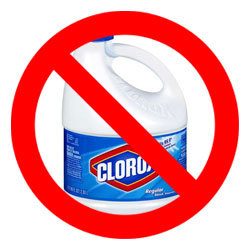
Can I Bleach My Dentures?
No. Please no.
Finally, this might seem obvious, but I’ve heard stories involving household bleach, boiling the denture in a pan, detergents, and methylated spirits being used as cleaning methods.
No bleach, no boiling hot water, no detergents, no methylated spirits.
Now That I Have Dentures, I Never Have To Go To The Dentist Again, Right?
Sorry, Charlie. Having dentures does not give you a hall pass from ever coming in to see us.
If you do, in fact, have complete dentures, it is a good idea to check in at least once a year for us to examine your gums for infection or inflammation, do an oral cancer screening, and evaluate the wear and fit of your denture(s).
The problem with an ill fitting denture is that it causes the ridge (jaw bone that your denture sits on) to shrink. So it’s much better to make adjustments early on, than to wait for it to go beyond the point causing you to require an entirely new denture.

If you wear a partial denture, then you definitely need to come in every 6 months, because the remaining teeth that your partial anchors to are more prone to collecting plaque. And again, minor tweaks can go a long way to prolonging the life and function of your partial denture.
So if your dog ate your dentures, or you dropped them down the toilet (also happens more often than you would think) and you would like to know what to do next, give me a call at the office (207) 782-5308.




